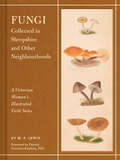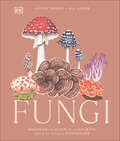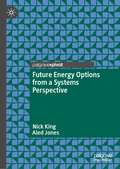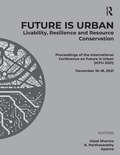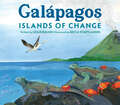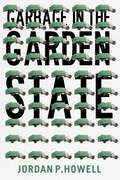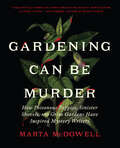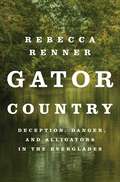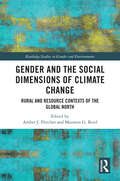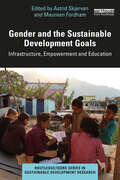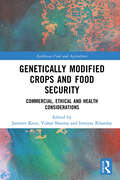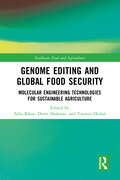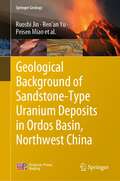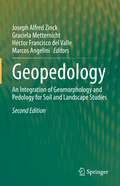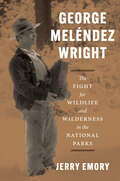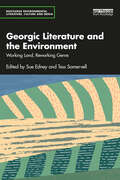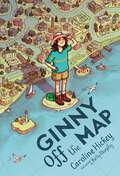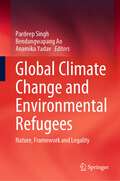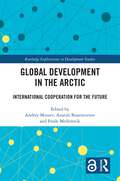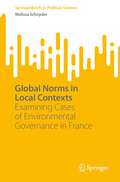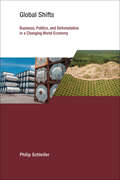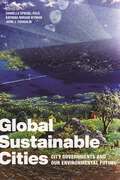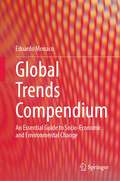- Table View
- List View
Fungi Collected in Shropshire and Other Neighbourhoods: A Victorian Woman's Illustrated Field Notes
by M. F. LewisVenture into the woods alongside a pioneering female mycologist. This one-of-a-kind, keepsake volume celebrates the timeless fascination of fungi.Very little is known about M. F. Lewis—not even her first name. Mysterious, prolific, and deeply enamored with the world of mushrooms, she left us a treasure trove of mycological illustrations. For over forty years, from 1860 to 1902, Lewis rambled across England and Wales, recording an astonishing biodiversity of fungi. Her delicately drawn, boldly colored images evoke the strange and powerful beauty of this kingdom. This handsome volume collects hundreds of Lewis's watercolors, contextualized by a foreword from mycologist Dr. Patricia Ononiwu Kaishian. It's a must-have for today's mushroom lovers who are curious about the history of mycology and for any admirer of vintage botanical illustration who wants to discover something different.FASCINATING FUNGI: Mushrooms are having a real moment, but they've always captured our imaginations, even in Victorian times. Lewis's gorgeous artwork offers the modern mushroom fan a new way to appreciate their favorite kingdom.VINTAGE AESTHETIC: This lovely clothbound volume evokes the magic of uncovering a treasure in a jumbled vintage bookstore. FEMINIST HISTORY: While little is known of the elusive M. F. Lewis, we can celebrate the legacy that she and other female naturalists of the 19th century left for women in science and art today.ARTFUL SCIENCE: Lewis's illustrated field notes showcase the intersection of art and science at its best.Perfect for:Mushroom hunters, eaters, and admirersFans of cottagecore and goblincore aestheticsCollectors of vintage books and vintage botanical illustrationCollectors of Victorian ephemeraReaders of feminist historyEnvironmentalists, scientists, and artists
Fungi: Discover the Science and Secrets Behind the World of Mushrooms (British Mycological Society Symposia Ser. #Series Number 15)
by Lynne Boddy Ali AshbyA stunning, authoritative book on the fungal kingdom, uncovering the hidden world of more than 300 global speciesDiscover the fascinating stories behind 300 species of fungi and understand the world of mushrooms like never before!Did you know that fungi put the fizz in champagne and the flavor in chocolate? Fungi is everywhere we look in a forest, under the sea, and in the kitchen.In this beautiful book, leading fungal biologists Lynne Boddy and Ali Ashby bring you closer to 300 species of mushrooms and lichens through fascinating facts, mushroom datasets, and detailed illustrations. Discover some of the fastest speeds in nature, specimens that glow in the dark, and fungi that clean up oil spills.Humans have had a close relationship with mushrooms for thousands of years-from using the shiitake for healing, to telling stories of enchanted fairy rings, to cooking gourmet dishes with rare specimens. Bringing together technology, medicine, food, culture, and nature, this fascinating book will open your eyes to the wonders of the hidden kingdom all around us.With tips for mushroom spotting in any habitat, species identification notes, a grow-your-own guide, and more, this book is the ultimate fungi lover's companion.
Future Energy Options from a Systems Perspective
by Aled Jones Nick KingThis book is an exploration of energy and its unique role to date as one of the fundamental enabling and controlling factors in human development and progress at the scale of global civilization, and how it will be fundamental to the type of future that collective humanity is likely to experience. The first section provides a contextual overview of energy and human civilization through a chronological description of how human energy use has evolved over time and led to the current ‘energy bind’. The second section explores what this energy bind might mean for our future energy choices when trying to meet the various challenges of dwindling resources, costs, and climate change, through exploration of three broad systems-based scenarios for the human ‘energy future’. The final section draws conclusions as to which scenario is most achievable and desirable, and what this might mean for longer-term human prospects.
Future is Urban: Proceedings of the International Conference on FUTURE IS URBAN: Livability, Resilience and Resource Conservation (ICFU 2021), December 16–18, 2021
by R. Parthasarathy Utpal SharmaCities have played an important role in our lives since the dawn of civilization. However, cities are slowly becoming overwhelmed and therefore intervention is desirable towards green, blue and egalitarian nature. Even with current urban issues, we must rise to the occasion as professionals to create cities that are social, cities that take care of the environment, and cities that are digital. Increased citizen participation is indispensable in this process. The ‘International Conference on Future is Urban (IFCU’ 21) Dec 16-18, 2021, Ahmedabad, India’, takes into account Livability, Resilience & Resource Conservation for planning Future and cities in future.
Galápagos: Islands of Change
by Leslie BulionA poetic introduction to a distinctive island ecosystem that is home to many species found nowhere else on Earth.Using the same poetry/science note format as Serengeti, Galápagos tells the complex story of a young volcanic ecosystem influenced by seasonal ocean currents, where food energy moves through integrated land and sea communities, each in its own season of growth and renewal.Millions of years ago, undersea volcanos in the eastern Pacific Ocean erupted, spewing up lava, rocks, and ash that eventually formed a cluster of islands: the archipelago known as the Galápagos Islands. Over time, castaway plants and animals from hundreds of miles away arrived on the rocky shores and adapted to each island&’s changing volcanic landscape and seasonal weather variations.In these isolated locations constantly affected by shifting winds and swift ocean currents, much of the wildlife evolved into species found nowhere else on Earth. Some of the many distinctive organisms featured include giant daisy trees, Galápagos penguins, marine iguanas, blue footed boobies, and Galápagos giant tortoises.The well-researched back matter includes poetry notes, a glossary, resources, and a list of the species from this remarkable ecosystem that are highlighted in the book.
Garbage in the Garden State (CERES: Rutgers Studies in History)
by Jordan P. HowellGarbage in the Garden State is the only book to examine the history of waste management in New Jersey. The state has played a pioneering role in the overall trajectory of waste management in the US. Howell's book is unique in the way that it places the contemporary challenges of waste management into their proper historical context – for instance, why does the system for recycling seem to work so poorly? Why do we have so many landfills in New Jersey, but also simultaneously not enough landfills or incinerators? Howell acknowledges that New Jersey is sometimes imagined, particularly by non-New Jerseyans, as a giant garbage dump for New York and Philadelphia. But every place has had to struggle with the challenges of waste management. New Jersey's trash history is in fact more interesting and more important than most. New Jersey’s waste history includes intensive planning, deep-seated political conflict, organized crime, and literally every level of state and federal judiciary. It is a colorful history, to say the least, and one that includes a number of firsts with regard to recycling, comprehensive planning, and the challenging economics of trash.
Gardening Can Be Murder: How Poisonous Poppies, Sinister Shovels, and Grim Gardens Have Inspired Mystery Writers
by Marta McDowellThis fun, engrossing book takes a look at the surprising influence that gardens and gardening have had on mystery novels and their authors. With their deadly plants, razor-sharp shears, shady corners, and ready-made burial sites, gardens make an ideal scene for the perfect murder. But the outsize influence that gardens and gardening have had on the mystery genre has been underappreciated. Now, Marta McDowell, a writer and gardener with a near-encyclopedic knowledge of the genre, illuminates the many ways in which our greatest mystery writers, from Edgar Allen Poe to authors on today&’s bestseller lists, have found inspiration in the sinister side of gardens. From the cozy to the hardboiled, the literary to the pulp, and the classic to the contemporary, Gardening Can Be Murder is the first book to explore the mystery genre&’s many surprising horticultural connections. Meet plant-obsessed detectives and spooky groundskeeper suspects, witness toxic teas served in foul play, and tour the gardens—both real and imagined—that have been the settings for fiction&’s ghastliest misdeeds. A New York Times bestselling author herself, McDowell also introduces us to some of today&’s top writers who consider gardening integral to their craft, assuring that horticultural themes will remain a staple of the genre for countless twisting plots to come. &“This book is dangerous. A veritable cornucopia of crime fiction and gardening lore, it faces the reader with multiple temptations—books to seek out, plants to obtain, garden tours to book.&” —Vicki Lane, author of the Elizabeth Goodweather Appalachian Mysteries
Gator Country: Deception, Danger, and Alligators in the Everglades
by Rebecca RennerA New York Times Editors' Choice"Delivers everything its title promises and much more." - NPR"Remarkable... Every species, and every person who fights for its continued existence, deserves a book like this." — The New York Times"This nail-biter account has the intensity of the best true crime... A high-def tale that ensnares you from the start." —PeopleDavid Grann meets Susan Orlean in this page-turning true story of an underground operation into the mysterious world of alligator poaching and its larger than life Floridian charactersTo catch a Florida Man, you have to become one, and that’s what Officer Jeff Babauta did. As his ponytailed, whiskey-soaked alter ego, he established Sunshine Alligator Farm. His goal? Infiltrate the shady world of illegal poachers in the Florida Everglades in order to protect the natural world.A head-spinning adventure soon unfolds. Jeff deals with glow-in-the-dark alligators and high-speed airboat rides, but quickly learns that not all poachers are villains. They’re simply people trying to survive, fighting against the poverty and greed holding them down. Jeff wants to solve the mystery of alligator poachers, and in doing so he must venture deeper into a strange ecosystem where right is wrong, and justice comes at the cost of those who’ve welcomed him into their world.Gator Country is the twisting true story of the impossible choices individuals must make to stay afloat in this world. Through its wholly unique blend of reporting, nature writing, and personal narrative, this book transports readers to vibrant and dangerous Florida landscapes and offers intimate portraits of those who call the region home. Broad in scope and vivid in detail, Gator Country is a fast paced tale of the risks people will take to survive in one of the world's most beautiful yet formidable landscapes and the undercover investigation that threatens to topple the whole scheme.
Gender and the Social Dimensions of Climate Change: Rural and Resource Contexts of the Global North (Routledge Studies in Gender and Environments)
by Amber J. Fletcher and Maureen G. ReedDispelling the myth that people in the Global North share similar experiences of climate change, this book reveals how intersecting social dimensions of climate change—people, processes, and institutions—give rise to different experiences of loss, adaptation, and resilience among those living in rural and resource contexts of the Global North. Bringing together leading feminist researchers and practitioners from three countries—Australia, Canada, and Spain—this collection documents gender relations in fossil fuel, mining, and extractive industries, in land-based livelihoods, in approaches for inclusive environmental policy, and in the lived experience of climate hazards. Uniquely, the book brings together the voices, expertise, and experiences of both academic researchers and women whose views have not been prioritized in formal policies—for example, women in agriculture, Indigenous women, immigrant women, and women in male-dominated professions. Their contributions are insightful and compelling, highlighting the significance of gaining diverse perspectives for a fuller understanding of climate change impacts, more equitable processes and strategies for climate change adaptation, and a more welcoming climate future. This book will be vital reading for students and scholars of gender studies, environmental studies, environmental sociology, geography, and sustainability science. It will provide important insights for planners, decision makers, and community advocates to strengthen their understanding of social dimensions of climate change and to develop more inclusive and equitable adaptation policies, plans, and practices.
Gender and the Sustainable Development Goals: Infrastructure, Empowerment and Education (Routledge/ISDRS Series in Sustainable Development Research)
by Astrid SkjervenThis book sheds light on the important and mostly neglected role that gender plays in achieving the UN Sustainable Development Goals, doing so by investigating three key problem areas: empowerment, education, and infrastructure. Starting with a theoretical and methodological framework, this edited collection contains 12 chapters from scholars and researchers from around the world. The book includes numerous case studies discussing the current status of gender equality relating to the SDGs. It reinforces the significance of gender for sustainable and just development, highlighting how women play a major role in work organization, disaster management, income, household maintenance, and mediation of knowledge. "Women" as a classification encompasses much diversity with many intersecting axes of difference; this book focuses on the excluded and disadvantaged majority social group, without imposing homogeneity on that categorization. Many chapters focus on critical situations occurring in the Global South, where these issues are highly prominent, and importantly, these contributions are written by local scholars. Finally, the volume provides pathways for basic and professional gender responsive education and innovation in the field. The book will generate important discussions in interdisciplinary research and higher education settings focusing on sustainable development, gender, equality, human rights, and education.
Genetically Modified Crops and Food Security: Commercial, Ethical and Health Considerations (Earthscan Food and Agriculture)
by Vishal Sharma Jasmeet Kour Imtiyaz KhandayThis book reviews a wide-range of genetically modified (GM) crops to understand how they are produced, the impacts on the agricultural industry, and their potential for improving food security. The production of GM crops has now become an invaluable asset in the agricultural toolbox. With a significant portion of the world suffering from hunger and poverty, this book examines how food security can be achieved through GM crops. A wide variety of crops are examined, from the earliest developments of GM tomatoes and potatoes to recent interest in the development of low-cost, high yielding biofuels, such as microalgae. Chapters also discuss the role of GM crops in pest management and the consequential reduction in the use of insecticides. Overall, this book provides an important synthesis of GM crops from their commercial value to the agricultural industry, as well as their potential for improving food security. This book will be of great interest to students and scholars of agricultural engineering, crop science, food biotechology, food security, and those interested in food and agriculture and sustainable development more broadly.
Genome Editing and Global Food Security: Molecular Engineering Technologies for Sustainable Agriculture (Earthscan Food and Agriculture)
by Zeba Khan Durre Shahwar Yasmin HeikalWith the rapid increase in the global population and changing climatic impacts on agriculture, this book demonstrates how genome editing will be an indispensable technique to overcome ongoing and prospective agricultural challenges. This book examines the role of genome editing in improving crop yields and contributing to global food security. It summarizes a range of genome editing techniques and discusses the roles they can play in producing a new generation of high-yielding, climate-ready crops. This includes site-specific nucleases, precision genome engineering, clustered regularly interspaced short palindromic repeats, and bioinformatics. It showcases how these gene editing techniques can tailor plants to not only increase yield-related traits but to also make them better suited to their environment and to be resistant to pests and extreme climatic events, such as droughts. The book also examines genome editing regulations and policies, the commercialization of genome-edited crops, and biosafety and biosecurity concerns. Overall, this book reveals and showcases how genome editing can improve crop resilience and production to address current and future agricultural challenges and alleviation of global food security concerns. This book will be of great interest to students and scholars of agricultural science, crop and plant science, genome editing, sustainable agriculture, biotechnology, and food security.
Geological Background of Sandstone-Type Uranium Deposits in Ordos Basin, Northwest China (Springer Geology)
by Ruoshi Jin Ren’an Yu Peisen MiaoThis book introduces the geological background of sandstone-type uranium deposits in the Ordos Basin, Northwest China. Through comparative study of a large number of practical data such as uranium, coal and oil boreholes, the research system takes sedimentary basin as a unit and fully utilizes geologicalprinciples and test analysis to study the basic geological, geophysical, geochemical and remote sensing image characteristics of the basin, and to restores the favorable uranium-forming geological background brought by the change of the cognitive sedimentary environment conditions. It can be used as a reference for researchers, practitioners and as well as teachers and graduate students working in uranium deposit geology, sedimentary geology and related areas
Geopedology: An Integration Of Geomorphology And Pedology For Soil And Landscape Studies
by Joseph Alfred Zinck Graciela Metternicht Héctor Francisco del Valle Marcos Angelini<p>This updated and revised second edition brings geopedology issues into the current context. This new edition extends the work on popular topics such as digital soil mapping, GIS and landscape mapping, and it also gives valuable insight with up-to-date theoretical discussions and new application with relevant case studies. This textbook offers a proven approach for reliable mapping of soil-landscape relationships to derive information for policy, planning and management at scales ranging from local to regional. Filled with didactic elements such as case studies, visual aids (maps, charts and figures), questions and answers, the book is of interest to geohazard studies, land use conflict analysis, land use planning, land degradation assessment, and land suitability analysis.<p> <p>Soil is a vital resource for society at large and an important determinant of the economic status of nations. The intensification of natural disasters and the increased land use competition for food and energy have raised awareness of the relevant role the pedosphere plays in natural and anthropogenic environments. Recent papers and global initiatives show a renewed interest in soil research and its applications for improved planning and management of this fragile and finite resource.<p>
George Meléndez Wright: The Fight for Wildlife and Wilderness in the National Parks
by Jerry EmoryThe first biography of a visionary biologist whose groundbreaking ideas regarding wildlife and science revolutionized national parks. When twenty-three-year-old George Meléndez Wright arrived in Yosemite National Park in 1927 to work as a ranger naturalist—the first Hispanic person to occupy any professional position in the National Park Service (NPS)—he had already visited every national park in the western United States, including McKinley (now Denali) in Alaska. Two years later, he would organize the first science-based wildlife survey of the western parks, forever changing how the NPS would manage wildlife and natural resources. At a time when national parks routinely fed bears garbage as part of “shows” and killed “bad” predators like wolves, mountain lions, and coyotes, Wright’s new ideas for conservation set the stage for the modern scientific management of parks and other public lands. Tragically, Wright died in a 1936 car accident while working to establish parks and wildlife refuges on the US-Mexico border. To this day, he remains a celebrated figure among conservationists, wildlife experts, and park managers. In this book, Jerry Emory, a conservationist and writer connected to Wright’s family, draws on hundreds of letters, field notes, archival research, interviews, and more to offer both a biography of Wright and a historical account of a crucial period in the evolution of US parks and the wilderness movement. With a foreword by former NPS director Jonathan B. Jarvis, George Meléndez Wright is a celebration of Wright’s unique upbringing, dynamism, and enduring vision that places him at last in the pantheon of the great American conservationists.
George Meléndez Wright: The Fight for Wildlife and Wilderness in the National Parks
by Jerry EmoryThe first biography of a visionary biologist whose groundbreaking ideas regarding wildlife and science revolutionized national parks. When twenty-three-year-old George Meléndez Wright arrived in Yosemite National Park in 1927 to work as a ranger naturalist—the first Hispanic person to occupy any professional position in the National Park Service (NPS)—he had already visited every national park in the western United States, including McKinley (now Denali) in Alaska. Two years later, he would organize the first science-based wildlife survey of the western parks, forever changing how the NPS would manage wildlife and natural resources. At a time when national parks routinely fed bears garbage as part of “shows” and killed “bad” predators like wolves, mountain lions, and coyotes, Wright’s new ideas for conservation set the stage for the modern scientific management of parks and other public lands. Tragically, Wright died in a 1936 car accident while working to establish parks and wildlife refuges on the US-Mexico border. To this day, he remains a celebrated figure among conservationists, wildlife experts, and park managers. In this book, Jerry Emory, a conservationist and writer connected to Wright’s family, draws on hundreds of letters, field notes, archival research, interviews, and more to offer both a biography of Wright and a historical account of a crucial period in the evolution of US parks and the wilderness movement. With a foreword by former NPS director Jonathan B. Jarvis, George Meléndez Wright is a celebration of Wright’s unique upbringing, dynamism, and enduring vision that places him at last in the pantheon of the great American conservationists.
Georgic Literature and the Environment: Working Land, Reworking Genre (Routledge Environmental Literature, Culture and Media)
by Sue Edney Tess SomervellThis expansive edited collection explores in depth the georgic genre and its connections to the natural world. Together, its chapters demonstrate that georgic—a genre based primarily on two classical poems about farming, Virgil’s Georgics and Hesiod’s Works and Days—has been reworked by writers throughout modern and early modern English-language literary history as a way of thinking about humans’ relationships with the environment. The book is divided into three sections: Defining Georgic, Managing Nature and Eco-Georgic for the Anthropocene. It centres the georgic genre in the ecocritical conversation, giving it equal prominence with pastoral, elegy and lyric as an example of ‘nature writing’ that can speak to urgent environmental questions throughout literary history and up to the present day. It provides an overview of the myriad ways georgic has been reworked in order to address human relationships with the environment, through focused case studies on individual texts and authors, including James Grainger, William Wordsworth, Henry David Thoreau, George Eliot, Thomas Hardy, Seamus Heaney, Judith Wright and Rachel Blau DuPlessis. This is a much-needed volume for literary critics, academics and students engaged in ecocritical studies, environmental humanities and literature, addressing a significantly overlooked environmental literary genre.
Ginny Off the Map
by Caroline HickeyA heartfelt coming-of-age novel about trying to find one&’s place in the world perfect for fans of Judy Blume, The Fourteenth Goldfish, and The Miscalculations of Lightning Girl. There are two things Ginny Pierce loves most in the world: geography facts and her father. But when her dad is deployed overseas and Ginny&’s family must move to yet another town, not even her facts can keep her afloat. The geography camp she&’s been anxiously awaiting gets canceled, and her new neighbors prefer her basketball-star sister. Worst of all, her dad is in a war zone and impossible to get ahold of. Ginny decides that running her own camp for the kids on her street will solve all her problems. But can she convince them (and herself) that there's more to her than just facts? With a fierce heart and steadfast determination, Ginny tackles the challenges and rewards of staying true to herself during a season of growth. This thoughtful novel explores the strength that develops through adversity; Ginny must learn to trust her inner compass as she navigates the world around her.A Kirkus Best Children's Book of the Year A Reading Middle Grade Best Book of the Year A Junior Library Guild Gold Standard Selection
Glaciers Are Alive
by Debbie S. MillerThis environmental picture book introduces young science and nature lovers to the wonders of glaciers, the wildlife that call them home, and how important they are to the health of our planet.A glacier may look forbidding and empty, but it supports abundant life. Follow a glacier as it flows from mountain to ocean, providing a home for ice worms, birds, bears, and more. Where the glacier meets the sea, it creates a rich environment for marine life such as seals, otters, and whales. As glaciers melt at a rapid rate due to climate change, their disappearance impacts not only the wildlife that calls them home, but also all life on earth. Glaciers are alive, and they need our protection!
Global Climate Change and Environmental Refugees: Nature, Framework and Legality
by Pardeep Singh Anamika Yadav Bendangwapang AoThis book explores the possibilities of understanding the concept of climate refugees in order to ascribe to a consensual agreement that climate refugees are evident and this situation is a reality.A framework to study both empirically and theoretically is presented in a detailed manner so that it may become a resource for understanding the challenges of climate refugees.Through discussion and analysis the book presents potential answers to such questions as:● Why has the international system been so short-sighted and has not given importance to the problems of climate migrants and refugees?● How to identify a climate refugee?● How do you justify a climate refugee or a migrant?● What are internally displaced people? Should we call them just refugees?The book covers the interdisciplinary nature of climate refugees and the perspectives of social science. The empirical findings provides an edge to holistically understanding climate refugees.This book discusses the concept of, what really is a climate refugee, and the necessary factors to make it an important part of the climate discourse. The legality of the term is missing in international parlance, and the academic discourse should provide the necessary critique required for the evolution of the subject under study. Therefore, the major objective of the book is to make the subject of climate migration known to all.
Global Development in the Arctic: International Cooperation for the Future (Routledge Explorations in Development Studies)
by Anatoli Bourmistrov Frode Mellemvik Andrey MineevViewing the Arctic as a key region for global development in the 21st century, this book offers a cross-disciplinary conceptual framework for understanding what international cooperation is, why it is difficult and what kind of alternative views can apply in the Arctic. Written by Arctic experts, the book presents major trends and scenarios for international cooperation in the Arctic up to 2035 and future prospects for international cooperation in the Arctic in various sectors: energy, business and economy, transportation and logistics, climate change, diplomacy and security, culture, innovations, higher education and research. Implications of the scenarios for global development are discussed in the light of the United Nations Agenda for Global Development and Sustainable Development Goals (SDGs). The book offers a cross-disciplinary conceptual framework of international cooperation in the Arctic and discusses implications of this framework for global development. Filling the gap in analytical understanding of international cooperation, this book will be of interest to academics, students and professionals concerned with global development and the Arctic region.
Global Norms in Local Contexts: Examining Cases of Environmental Governance in France (SpringerBriefs in Political Science)
by Melissa SchnyderThis Brief discusses the translation of global environmental norms across local contexts in France. It provides a snapshot of how global-level environmental norms travel vertically across levels of governance, from the global to the local, and asks how global environmental norms are (re)interpreted by local-level actors and translated to a particular local context. Chapters focus on three in-depth case studies, each involving multi-stakeholder environmental governance: (1) the Cerbère-Banyuls Marine Nature Reserve, (2) the Thau Fisheries Local Action Group (FLAG), and (3) the Biovallée biodistrict. In each of these cases, the author assesses how twilight norms are used to frame, promote, and generally develop a local discourse that centers on environmental conservation and sustainability. By combining concepts from the literature on norm localization with processes from the literature on norm-based institutional change, this Brief will generate new insights on the dynamic aspects of norm translation. As such, it will be of interest to researchers studying environmental politics, comparative policy, governance, and norms.
Global Shifts: Business, Politics, and Deforestation in a Changing World Economy
by Philip SchleiferWhat global shifts in markets and power mean for the politics and governance of sustainability.In recent years, major shifts in global markets from North to South have created a new geography of trade and consumption, particularly in the agricultural sector. How this shift affects the governance of sustainability, and thus the future of the planet, is the pressing topic Philip Schleifer takes up in this book. The processes of twenty-first-century globalization are fundamentally changing the politics and governance of commodity production, Schleifer argues, with profound implications for the environment in the food-producing countries of the Global South. At the center of Schleifer's study are Brazil and Indonesia—two key sites of experimentation in new models of global environmental and commodity governance—where palm oil and soy supply chains have seen unprecedented degrees of private environmental governance in recent years. However, instead of transforming these industries, the diffusion of transnational sustainability standards has accompanied a worsening ecological crisis, with mounting evidence of increasingly strong links between deforestation and globalization in twenty-first-century agricultural trade. To uncover the causes of this governance failure, Schleifer develops a multi-level framework for analyzing how contemporary globalization is reconfiguring the political economies of such industries. The result is the first comprehensive analysis of the shift of global agricultural trade to the South and the deepening crisis of commodity-driven deforestation—and a complex and evolving picture of both the risks and opportunities for sustainability presented by this transformative shift.
Global Sustainable Cities: City Governments and Our Environmental Future
by Danielle Spiegel-Feld, Katrina Miriam Wyman, and John J. CoughlinPerspectives from worldwide experts on how major cities across the globe are responding to the major environmental threats of our time, including global climate change Over half of the world’s population now lives in cities, and this share is expected to increase in the coming decades. With growing urbanization, cities and their residents face substantial environmental challenges such as higher temperatures, droughts, wildfires, and increased flooding. In response to these pressing challenges, some cities have begun to develop local environmental regulations that supplement national and environmental laws. In so doing, cities have stepped into a role that has been historically dominated by higher levels of government.Global Sustainable Cities takes stock of the policies that have been implemented by cities around the world in recent years in several key areas: water, air pollution, greenhouse gas emissions, and climate adaptation. It examines the advantages—and potential drawbacks—of allowing cities to assume a significant role in environmental regulation, given the legal and political constraints in which cities operate.The contributors present a series of case studies of the actions that seven leading cities—Abu Dhabi, Beijing, Berlin, Delhi, London, New York, and Shanghai—are taking to improve their environments and adapt to climate change. The first volume of its kind, Global Sustainable Cities is a critical comparative assessment of the actions that major cities in the global North and South are taking to advance sustainability.
Global Trends Compendium: An Essential Guide to Socio-Economic and Environmental Change
by Edoardo MonacoThis Compendium was conceived as a “pocket compass”, a practical guide that may help readers to orientate themselves while they explore global affairs and attempt to make sense of the highly interconnected, multidimensional challenges of contemporary human development. The book is intended to be an accessible, concise, yet comprehensive reference for anyone who hopes to better understand today’s world and its dramatic complexity. The aim is to highlight a relevant selection of the demographic, socio-economic, geo-political, and environmental macro-dynamics that define our time, and to explore in a practical way the indicators that can be used to monitor their evolution over time. In general, this project stems from the need to apply “systemic thinking” to the study of the world and to develop a holistic perspective that can bridge the gap that for too long has existed across academic disciplines and their respective focuses. The macro-trends featured in the book shed light, in particular, on the change that has been occurring over time in the vast Global South – a portion of the globe that accounts for over 80% of the world’s total population. The book’s ultimate – although not exclusive – target audience is undoubtedly composed of undergraduate students of subjects such as political science, international affairs, international development, human geography and the like. In addition, the Compendium may benefit professionals in both public and private organisations as well as members of the general public seeking to acquire "global development literacy" in manners that are academically sound, but also accessible and concise.
